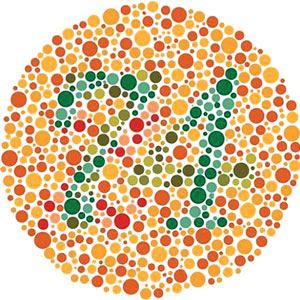26 Jul 2017 - {{hitsCtrl.values.hits}}

 Have you ever seen a breathtaking picturesque scene of Mother Nature in all her glory and wondered how beautiful life can be, while taking in every shade of colour? But what would happen if you were plunged into a world of shadows, unable to see certain colours or worse a world consisting only of grey? This is the day in a life of a person suffering from colour blindness.
Have you ever seen a breathtaking picturesque scene of Mother Nature in all her glory and wondered how beautiful life can be, while taking in every shade of colour? But what would happen if you were plunged into a world of shadows, unable to see certain colours or worse a world consisting only of grey? This is the day in a life of a person suffering from colour blindness.
“Blue is the richest colour for me, I can see all of blue”-Mark Zuckerburg, Co-Founder of Facebook
Ever wondered why facebook’s main colour is all about blue? Mark Zuckerburg, the co-founder of facebook and a successful internet entrepreneur, is red-green colour blind. Blue is a colour that he can see with great visual acuity, hence becoming the theme colour of facebook.
What is colour blindness? What causes colour blindness? Can it be cured? Dr.M. Wijetunge, Retired Consultant Eye Surgeon of the Ragama Teaching Hospital, shed more ‘colour’ to the questions revolving around colour blindness.
Definition 
Colour blindness is the decreased ability to see colour or the inability to differentiate between certain colours. Dr.Wijetunge stated that more men fall victim to the clutches of colour blindness compared to females. “About 5-8% of men suffer from colourblindness while female patients with this defect are 0.5-0.8% of the world population,” said Dr. Wijetunge.
Types
“There are several types of colour blindness depending on the defect of the eye, such as red-green colour blindness, yellow-blue colour blindness and total colour blindness among other types,” the doctor added. According to Dr. Wijetunge, the most common type of colour blindness is the red-green colour blindness where, in most cases, the patient is unable to distinguish between green-yellow-red shades from a mixture of colours. As with yellow-blue colour blindness, patients are unable to distinguish between bluish and greenish colours as well as yellowish and reddish colours. Total colour blindness opts for a person to see a world without colour; they see every picturesque view of the world in a shade of grey.
Causes
The eye consists of light sensitive cells known as photoreceptors. There are namely two types of photoreceptors: Rods and Cones, both which are found in the retina of the eye. Rods are responsible for night vision while cones work in daylight to help colour vision. There are three types of cones, each which responds to a different wavelength of light. They are red, green and blue cones. Depending on the amount or deficiency of a certain type of cones, it results in certain types of colour blindness. For example, a faulty red cone may cause you not to see colours containing red clearly. The majority of patients suffering from colour blindness cannot distinguish between red and green shades.
“In the majority of colour blind cases, it’s a hereditary disease. When it comes to the reason of being inherited, more males tend to be sufferers from colourblindness than females,” explained Dr. Wijetunge. The sex chromosomes specify the gender of a human. In females, the chromosomes are XX whereas in males the chromosomes are XY. The disease is caused by an affected X chromosome. In females, since they have two X chromosomes, just one affected chromosome won’t affect females (though they tend to be carriers of the disease), unless they bear two affected X chromosomes. But males only carry one X chromosome, so the probability of men falling victim to colour blindness is higher than females. But colour blindness can darken the vision of any citizen with age. This is due to the contraction of diseases such as glaucoma, macular degeneration and optic nerve degeneration.
Can it be cured?
“The answer is ‘No’. The disease can’t be made worse or better in any event. Colour blindness remains for life.” Though this impairment of vision can’t be cured, the effects of colourblindness can be reduced with special types of lenses and apps. The minimization may not be all that successful, but makes life just a bit easier for those suffering from this ailment as it helps them to increase the ability to differentiate between colours although nothing can help them to truly see the deficient colour.
Tests
According to Dr. Wijetunge, there are a few tests to confirm colour blindness. Among them is the Ishihara Test, 100 Hue Colour Vision Test and Colour Arrangement Test. “The most popular of the colour blindness tests is the Ishihara Test. This vision test includes 38 plates which are arranged in colourful dots which hold a hidden number or line. Based on what you see and what you don’t see, your state of vision is affirmed. For example, consider an Ishihara plate bearing the number 74. People with normal vision should see the number as 74 without any problem. People, who are colour blind, see the number as 21 while those with total colour blindness may not be able to see a number at all.”
Does it restrict daily activities?
While the inability to differentiate certain colours may restrict a patient from engaging in activities such as driving and piloting, and even mundane chores like choosing vegetables and fruits, there’s still a world of opportunities open to them. Art is all about colour, but being colour blind doesn’t impose a barrier to the artistic sensibilities of a person. While the limitation such as the inability to drive are important to safeguard a person’s safety, colour blindness should never be an excuse of blinding one from a colourful future.
23 Dec 2024 8 hours ago
23 Dec 2024 9 hours ago
23 Dec 2024 23 Dec 2024
23 Dec 2024 23 Dec 2024